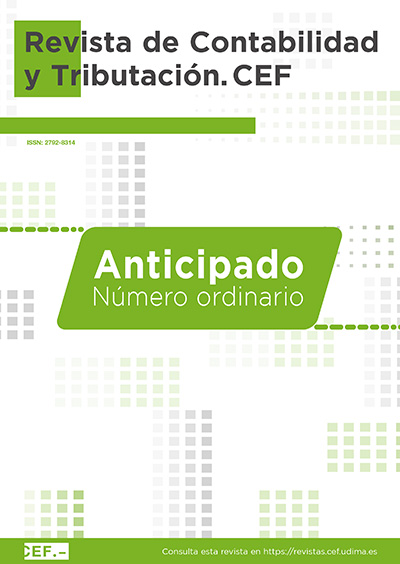Alfabetización financiera de las personas emprendedoras y el efecto Dunning-Kruger
DOI:
https://doi.org/10.51302/rcyt.2025.22395Palabras clave:
competencias contables y financieras del emprendedor, alfabetización financiera, sesgos cognitivosResumen
Este artículo tiene como objetivo principal investigar la presencia del efecto Dunning-Kruger en emprendedores, con un enfoque específico en su nivel de competencias contables y financieras, es decir, su alfabetización financiera. El efecto Dunning-Kruger es un fenómeno psicológico que se manifiesta en la incapacidad de las personas para evaluar con precisión su propio nivel de competencia sobre un tema en concreto. Adicionalmente, se analizan los antecedentes y consecuencias de este fenómeno. Se utiliza una base de datos propia formada por las respuestas de 194 emprendedores inscritos en programas de apoyo y estímulo al emprendimiento en España. Los resultados sugieren que los emprendedores con menores competencias financieras tienden a sobreestimar sus habilidades, mientras que aquellos con mayores competencias tienden a subestimarlas. Esta inexactitud en la autoevaluación impacta en aspectos clave de la gestión empresarial, como la disposición a delegar tareas contables y financieras y la motivación para seguir formándose en esta área. Además, se observa que la edad y el nivel educativo del emprendedor están negativamente asociados con la presencia del efecto Dunning-Kruger, sugiriendo que emprendedores más educados y mayores son menos propensos a este sesgo.
Descargas
Citas
Balasubramnian, S. y Sargent, M. (2020). Impact of Inflated Perceptions of Financial Literacy on Financial Decision Making. Journal of Economic Psychology, 80, 102306. https://doi.org/10.1016/j.joep.2020.102306
Dillman, D. A. (2011). Mail and Internet Surveys: The Tailored Design Method-2007 Update with New Internet, Visual, and Mixed-Mode Guide. Wiley.
Dunning, D. (2011). The Dunning-Kruger Effect: On Being Ignorant of One's Own Ignorance. En J. M. Olson y M. P. Zanna (eds.), Advances in Experimental Social Psychology, 44, 247-296. Academic Press. https://doi.org/10.1016/B978-0-12-385522-0.00005-6
Ehrlinger, J., Johnson, K., Banner, M., Dunning, D. y Kruger, J. (2008). Why the Unskilled Are Unaware: Further Explorations of (Absent) Self-Insight among the Incompetent. Organizational Behavior and Human Decision Processes, 105(1), 98-121. https://doi.org/10.1016/j.obhdp.2007.05.002
Fernández-López, S., Álvarez-Espiño, M. y Rey-Ares, L. (2023). Las características empresariales como determinantes de la alfabetización financiera de las personas empresarias. The Journal of Globalization, Competitiveness, and Governability, 17(3), 73-88. https://doi.org/10.58416/GCG.2023.V17.N3.03
Finke, M. S., Howe, J. S. y Huston, S. J. (2017). Old Age and the Decline in Financial Literacy. Management Science, 63(1), 213-230.
Gignac, G. E. (2022). The Association between Objective and Subjective Financial Literacy: Failure to Observe the Dunning-Kruger Effect. Personality and Individual Differences, 189, 111224. https://doi.org/10.1016/j.paid.2021.111224
Graña-Álvarez, R., Gómez-Conde, J., López-Valeiras, E. y González-Loureiro, M. (2024b). Management Control Systems, Business Financial Literacy and Financial Leverage in Business-Incubated Start-Ups. The British Accounting Review, 56(6), 101427.
Graña-Álvarez, R., López-Valeiras, E., González-Loureiro, M. y Coronado, F. (2024a). Financial literacy in SMEs: A Systematic Literature Review and a Framework for Further Inquiry. Journal of Small Business Management, 62(1), 331-380. https://doi.org/10.1080/00472778.2022.2051176
Graña-Álvarez, R., López-Valeiras, E., González-Loureiro, M., Coronado, F. y Malagueño, R. (2021). Alfabetización financiera en empresas incubadas y sus implicaciones organizativas. FUNCAS.
Kruger, J. y Dunning, D. (1999). Unskilled and Unaware of It: How Difficulties in Recognizing One's Own Incompetence Leads to Inflated Self-Assessments. Journal of Personality & Social Psychology, 77(6), 1121-1134. https://doi.org/10.1037//0022-3514.77.6.1121
Kruger, J. y Dunning, D. (2009). Why People Fail to Recognize Their Own Incompetence. Current Directions in Psychological Science, 12(3), 83-87. https://doi.org/10.1111/1467-8721.01235
López-Valeiras, E., Graña-Álvarez, R., Martínez-Cobas, X., Fernández, L. y Rodríguez-Lourido, S (2023). Programas de educación financiera para emprendedores: evaluación de resultados y potencial de mejora. FUNCAS.
Lusardi, A. y Mitchell, O. (2014). The Economic Importance of Financial Literacy: Theory and Evidence. Journal of Economic Literature, 52(1), 5-44. http://dx.doi.org/10.1257/jel.52.1.5
Molina-García, A., Diéguez-Soto, J., Galache-Laza, M. T. y Campos-Valenzuela, M. (2023). Financial Literacy in SMEs: A Bibliometric Analysis and a Systematic Literature Review of an Emerging Research Field. Review of Managerial Science, 17, 787-826. https://doi.org/10.1007/s11846-022-00556-2
Rostamkalaei, A., Nitani, M. y Riding, A. (2022). Self-Employment, Financial Knowledge, and Retirement Planning. Journal of Small Business Management, 60(1), 1-30. https://doi.org/10.1080/00472778.2019.1695497
Shepherd, D. A., Williams, T. A. y Patzelt, H. (2015). Thinking about Entrepreneurial Decision Making: Review and Research Agenda. Journal of Management, 41(1), 11-46. https://doi.org/10.1177/0149206314541153
Trombetta, M. (2023). Accounting and Finance Literacy and Entrepreneurship: An Exploratory Study. Journal of Accounting and Public Policy, 42(2), 107078. https://doi.org/10.1016/j.jaccpubpol.2023.107078
Xin, Z., Xiao, B., Wang, L. y Xiao, H. (2024). Individuals’ Differences in Self-Assessment: The Relationship between Subjective and Objective Financial Literacy. Metacognition and Learning, 19, 365-379. https://doi.org/10.1007/s11409-024-09375-0
Descargas
Publicado
Versiones
- 05-02-2025 (3)
- 21-01-2025 (2)
- 21-01-2025 (1)















